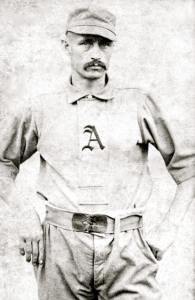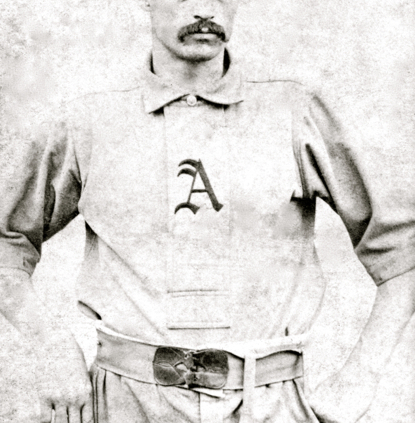September 23, 1883: Philadelphia Athletics clinch a tie for the American Association pennant
 After a season spent at or near the top of the league and the ultimate prize within sight, the exhausted Athletics arrived in St. Louis on September 20 with a 2-½ game lead over the Browns. As fans back in Philadelphia anxiously awaited news and planned a victory parade, the Athletics and Browns split the first two games. The Athletics hung on to win the series opener, 13-11, as arm-weary Bobby Mathews notched his 30th victory of the season. The Browns countered with a 9-6 victory in the second game. Knowing a victory in the rubber game would guarantee them a tie for first place, the Athletics chose a battery of George Bradley, who’d been hit hard by Cincinnati in his previous start, and Jack O’Brien. The sentiment was that Bradley was ripe to have “his eye knocked out,” by the well-heeled, hard charging Browns.1 St. Louis countered with batterymen Tony Mullane and Tom Dolan.
After a season spent at or near the top of the league and the ultimate prize within sight, the exhausted Athletics arrived in St. Louis on September 20 with a 2-½ game lead over the Browns. As fans back in Philadelphia anxiously awaited news and planned a victory parade, the Athletics and Browns split the first two games. The Athletics hung on to win the series opener, 13-11, as arm-weary Bobby Mathews notched his 30th victory of the season. The Browns countered with a 9-6 victory in the second game. Knowing a victory in the rubber game would guarantee them a tie for first place, the Athletics chose a battery of George Bradley, who’d been hit hard by Cincinnati in his previous start, and Jack O’Brien. The sentiment was that Bradley was ripe to have “his eye knocked out,” by the well-heeled, hard charging Browns.1 St. Louis countered with batterymen Tony Mullane and Tom Dolan.
Unseasonably cool temperatures greeted the record-breaking overflow crowd of 16,800 fans who jammed Sportsman’s Park that day.2 The morning low in St. Louis was a record 43 degrees and temperatures warmed up only to the mid-60s by game time, approximately 15 degrees cooler than the average temperature in St. Louis for that time of year.
Sportsman’s Park was one of the finest facilities in the American Association. The renovated former Grand Avenue Grounds opened in 1881 and was an innovative multipurpose entertainment facility. It included “a cricket field … a baseball diamond, cinder paths for ‘sprinters,’ a handball court, bowling alleys and everything of that sort.”3 Complete with a beer garden in right field and a newly constructed Bulletin Board (out-of-town scoreboard) that owner Chris Van der Ahe had installed in spring of 1883, Sportsman’s Park was an oasis enjoyed by St. Louis working class and immigrant populations.
The Athletics’ captain, Harry Stovey, won the coin toss and elected to send St. Louis to bat while his team took the field. After the Browns were held scoreless in the top of the first, the Athletics quickly took a 2-0 lead in the bottom half of the inning. Left fielder Jud Birchall led off with a single to right field. Stovey then smashed one into the crowd standing in right-center field. Under normal circumstances, the hit surely would have scored the speedy Birchall. However the ad hoc grounds rule in effect for the game awarded Stovey a double and forced Birchall to stop at third. With runners on second and third and no one down, right fielder Lon Knight grounded out to Arlie Latham at third to score Birchall as Stovey advanced to third. A wild pitch by Mullane allowed Stovey to score. The last two batters went out quietly and neither team scored over the next two innings; Fred Corey of the Athletics was the only player to reach base, with a second-inning single.
St. Louis threatened in the top of the fourth when little Hugh Nicol, considered a nineteenth-century forerunner of Ozzie Smith because of his showmanship and acrobatic antics on the field, lined a single to left-center with two out. 4 A passed ball allowed him to advance to second before he stole third. However, Joe Quest watched a third strike go by to end the inning.
In the bottom of the fifth, the Athletics added three runs. Second baseman Cub Stricker singled, stole second, and went to third on a wild pitch. Birchall followed with a slow grounder to first that St. Louis captain Charles Comiskey fielded. He attempted to throw Stricker out at the plate, but Comiskey’s throw was late and catcher Dolan foolishly threw to first to get Birchall while Comiskey was out of position. The ball sailed into right field and Birchall took second. Stovey followed with a single scoring Birchall and continued to second when Dolan mishandled the throw. The Athletics plated their third run of the inning when center fielder Fred Lewis, recently reinstated after an alcohol-related suspension, dropped a fly ball off the bat of Knight.5 At the end of five innings, the Athletics had a commanding 5-0 lead.
The Athletics tacked on another run in the sixth on Corey’s walk and, belying his ninth spot in the batting order, a double by Stricker. They kept piling on in the seventh when Stovey hit another grounds-rule double and scored on two more wild pitches by Mullane. The Browns right-hander was charged with five wild pitches in the game.
The Browns, who had been silenced by Bradley on only two hits through the first seven innings, finally managed to push a run across the plate in the eighth thanks to errors by Stricker and shortstop Mike Moynahan. With one out, Mullane reached safely on Stricker’s miscue at second. After the Browns pitcher stole second, Dolan sent a grounder to shortstop that was mishandled by Moynahan. Dolan also stole second to put runners at second and third. Moynahan atoned for his error on the very next play when Bill Gleason drove the ball hard up the middle. Moynahan made a “splendid stop” and threw Gleason out at first as Mullane scored the Browns’ first run of the game.6 Comiskey ended the inning when he grounded out to Corey at third, stranding Dolan.
The Athletics increased their lead to eight runs by scoring twice more in the bottom of the inning. Corey singled past shortstop to lead off the inning and center fielder Bob Blakiston followed with a single to center. Three batters later, Birchall sent a two-out double over the head of the left fielder that plated two more runs. After eight innings the Athletics lead was 9-1.
The Athletics appeared to be ready to wrap the game up and celebrate a share of the Association title when the first two Browns batters were retired to start the ninth. A hush fell over Sportsman’s Park and the crowd started heading for the exits. However, true to the grit they had shown all season, the Browns failed to go quietly.
Quest singled to center field and advanced to second on a passed ball. Latham followed with what appeared to be a game-ending grounder to Corey at third, but as the remaining crowd rushed onto the diamond, Stovey dropped Corey’s throw, and Quest came around to score amid the confusion. The Athletics claimed he hadn’t touched third, but umpire Charley Daniels, watching the play at first, hadn’t seen it and allowed the run. By this time the crowd covered the whole field in a march to the exits, and it took several minutes to clear the field so play could continue. Once play resumed, left fielder George Strief grounded out to Stricker at second to end the game, which had lasted an hour and 40 minutes.
Now with a 3½-game lead and four games to play against the second-division Eclipse, who had fallen 15½ games off the pace in the season’s waning weeks, the Athletics appeared to be a shoo-in for the pennant. As it turned out, they earned it by the skin of their teeth, with only an extra-inning victory in the third game allowing them to capture the American Association flag.
Sources
In addition to the sources cited in the Notes, the authors relied on Baseball-Reference.com and Retrosheet. Other sources included the St. Louis Globe-Democrat of September 24, 1883, and the New York Clipper.
Notes
1 “Sporting News: The Athletics Demolish the Local Team,” St. Louis Post-Dispatch, September 24, 1883: 9.
2 David Nemec, The Illustrated History of the American Association – Baseball’s Renegade Major League (New York: Lyons & Buford, Publishers, 1994), 53.
3 Edward Achorn, The Summer of Beer and Whiskey (New York: Public Affairs, 2006), 13.
4 Charles F. Faber, “Hugh Nicol,” SABR BioProject. Retrieved from sabr.org/bioproj/person/9cdc28a3.
5 “Notes and Comments,” Sporting Life, September 24, 1883: 6.
6 “St. Louis Badly Beaten: The Champion Pennant About Won,” The Times (Philadelphia), September 24, 1883: 1.
Additional Stats
Philadelphia Athletics 9
St. Louis Browns 2
Sportsman’s Park
St. Louis, MO
Corrections? Additions?
If you can help us improve this game story, contact us.


